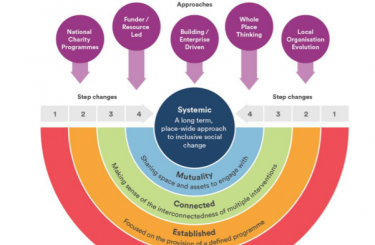Related


Place and place-based work is ‘having a moment’ in the social and philanthropic sectors but it has absorbed the social enterprise Renaisi for more than 20 years, and much of that time has been spent working in and thinking about London.
Renaisi’s CEO John Hitchin joined London Funders’ new Advisory group on place to share a paper exploring what’s next for place-based funding in London on 11th October. The group has been set up to re-examine what place means in light of the covid-19 pandemic and generate new thinking about the opportunities and challenges this may bring.
London may seem less relevant to place-discourse because its size, economic weight and hyper-connectivity mean it is not neatly into defined and contained like other areas. Neither is it thefocus of current government interest in places:
Imagine if we could level up – not just lengthening London’s lead around the world. But closing the gap between London and the rest of the UK’s great cities. That would increase the national GDP by tens of billions
Prime Minister Boris Johnson
But the fact that London is different to other parts of the UK doesn’t mean that Place can’t be a useful concept in some cases. Place-based approaches have been and are continuing to make a difference for London. Take a look at the work of The Cares Family in North, South and now East London, the Peabody Trust on the Pembury Estate in Hackney or West London Zone’s work with children and young people.
What was important to attendees of the London Funders Advisory Group was a need to be clearer about when Place isn’t important so as to keep the focus and energy on when it is important. The paper poses questions throughout that funders, and others, can ask of themselves and their work to help with deciding if Place is the right tool for the job. Read the paper for:
Click here for 'What’s Next for Place-Based Funding in London?'

